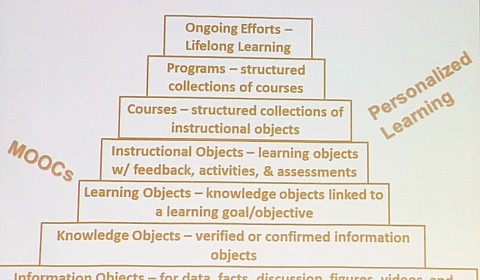International Mobile Learning Festival
Hong Kong
22-23 May, 2015
I was only able to make it to second day of the International Mobile Learning Festival in Hong Kong, hosted by Hong Kong University at the Admiralty Centre, but it was great to take part in this dynamic event.
I opened the second day with my plenary, Mobile Design: 21st Century Approaches to Learning, where I discussed the importance of teachers seeing themselves as designers of student learning experiences which are aligned with transformative pedagogies and 21st century skills, while always remembering to take their own, and their students’, technological contexts as a starting point.
In his plenary, Designing, Modeling and Constructing: New Learning Paradigms, Michael Spector suggested that learning design must always be accompanied by evaluation at every stage. He went on to say that technologies change, contexts change, interests change, but learning does not change (when it is understood as a naturally occuring process inovlving changes in what a person knows and can do). It is the best and the worst of times at the moment: there are so many technologies available, but it is challenging for learning designers. He gave a detailed example of the work of the US National Technology Leadership Coalition in using 3D printing to support Next Generation Science Standards, with some positive results. He suggested that there is a whole hierarchy of components to support learning and instruction, as seen in the image below.
It is important, he noted, not to over-promise on technology. The gains due to technology since 1950 are not that great. We must keep our focus on teaching and learning, with the technology in a supporting role.
In their paper, Authentic Mobile Learning, Kevin Burden and Matthew Kearney noted that we need to interrogate what is meant by ‘authenticity’ when it comes to mobile learning. Authenticity, they suggested, may not just be about the context (which ranges from simulated to participatory), but about planning and design (whether teachers pre-define the learning experience, or give students more agency and allow the learning to be emergent) and personal relevance (whether students are detached from the learning, or engaged in the learning).
In her presentation, Flipping the MOOC Global/Local Collaboration: Understanding the Visual and Verbal Metaphors, Yilin Chen spoke about fostering 21st century skills (like creativity and visual literacy) through a flipped course based on the work of Shakespeare. For example, when studying Romeo and Juliet, the students were asked to look at manga adapations. They were also asked to create visual representations of key images in soliloquys, before considering how these could be represented creatively on the stage. Students later did Skype auditions, following which scenes were rehearsed and staged.
In his presentation, Transforming Outdoor Learning with the Use of Location-based Technology and Rapid Authoring Tool: Singapore Experience, Png Bee Hin gave an update on the work being done by LDR on augmented reality learning trails in Singapore. He outlined the growth of location-based technologies, which are expanding particularly rapidly in the Asian region. Pocket Trips is LDR’s new web-based authoring platform that can allow users to create learning trails anywhere in the world using a variety of triggers (GPS, image recognition or Bluetooth smart technology based on beacons, which now have a battery life of up to 5 years); a simulator allows users to test the app on their mobile devices without going to the actual location.
All in all, I’m beginning to sense a shift in the themes of mobile learning conferences. While there are still plenty of (necessary) case studies being reported, more and more presenters are beginning to tackle conceptual issues. It’s an exciting time, and a sign of the coming-of-age of a field, when foundational theories start to take shape. This is a shift we should keep our eyes on over the next couple of years.

